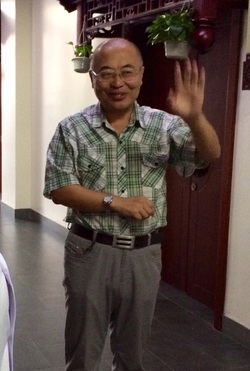
On any given day, current patients will start coming in at 7.30 in the morning and go into the treatment room, which has about 14 beds. When the doctor arrives -- sometimes with bags of fruit or some delicacy that he shares with others -- the students are ready to hand him needles, which he deftly sticks into each waiting patient, no notes needed, he knows all their conditions.
The doctor always inserts needles into patients' scalps, and might insert needles into body points. Often he will give instructions to the student on which points to use, then go on to the next patient. Always he has a few words with each patient, always smiling, always encouraging. He touches each one of them on the shoulder, his bedside manners honed by 35-40 years of practice.
Then he starts seeing new patients (or perhaps ones he has seen before but are coming for another consultation). His consultation room is usually heaving with people -- patients and their relatives, lots of students who are either helping or observing (if they are helping, they are taking notes on the computer or taking down herbal prescriptions on the patients' little clinic notebook, acting as receptionist, or creating official order forms), and hospital staff who might want a word with him.
Dr Cheng is the top chap for strokes and facial paralysis in this part of northeastern China, but he is more like a GP (general practitioner) in the range of conditions he sees, anything from insomnia and back pain, to tinnitus and hyperactivity (ADHD). One boy who looked about 10 years old came in with his mother. He came three years ago for ADHD and was given herbs. I could not see signs of hyperactivity in this boy, he looked healthy and his eyes full of spirit. I was told the herbs have helped enormously -- I certainly agreed with that. Back home he would have been given Ritalin, like thousands of other boys.
Next week our motley crew will move on to a dermatological clinic, where herbs are used (not so much acupuncture). But first, there is the weekend to enjoy.
 RSS Feed
RSS Feed